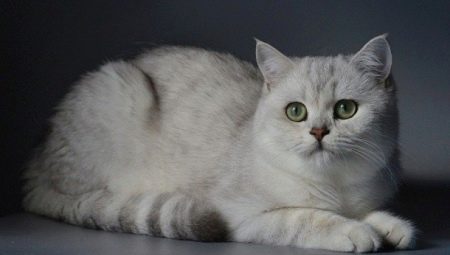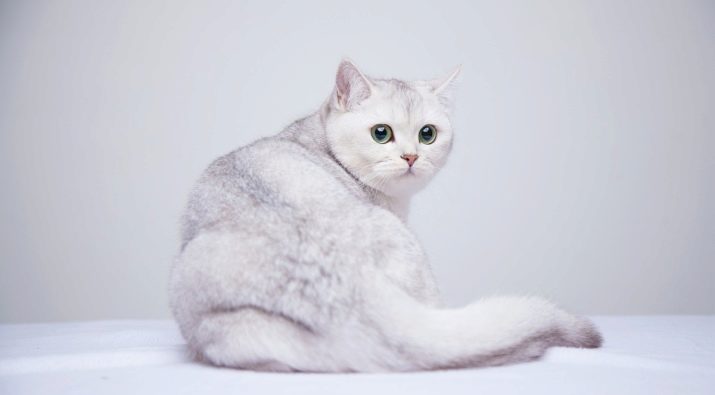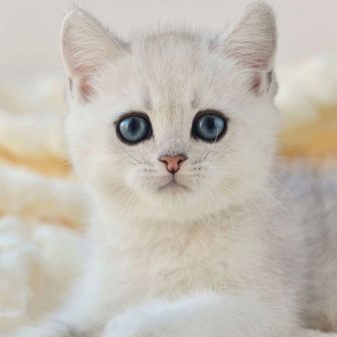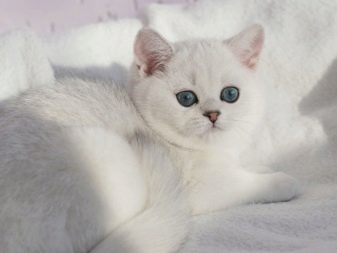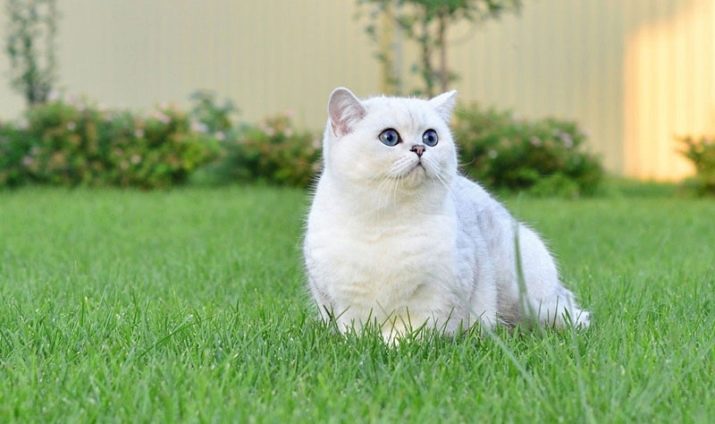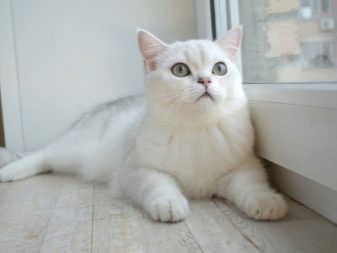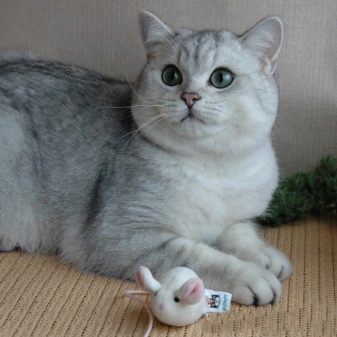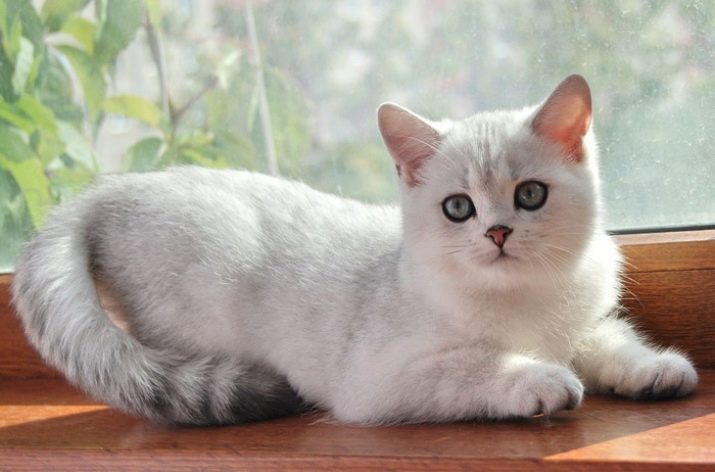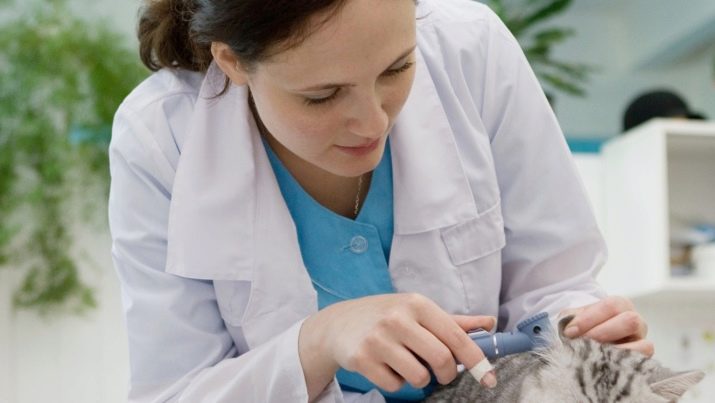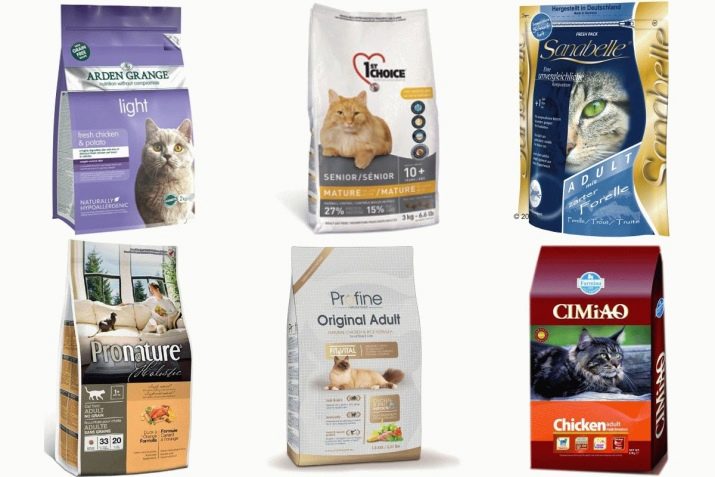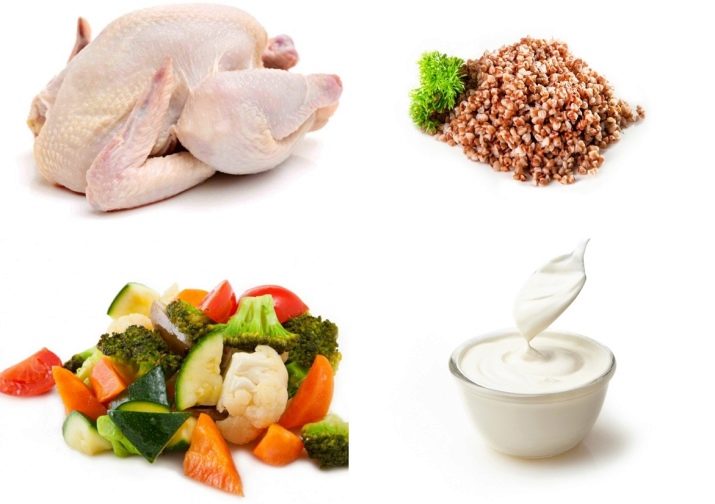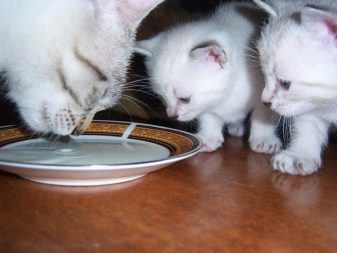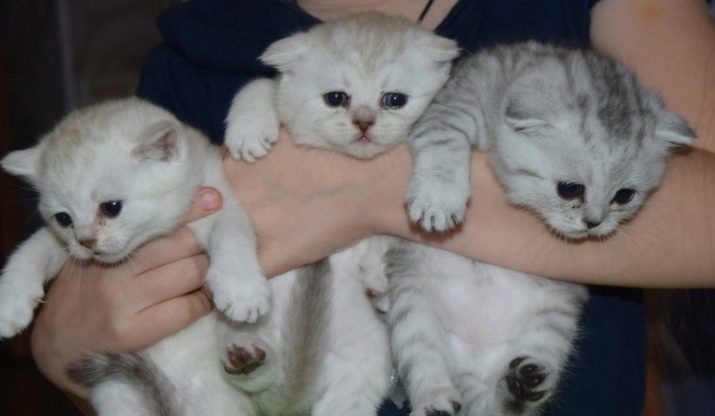Silver British chinchillas are real English aristocrats who are honored not only in Great Britain, but also all over the world for their luxurious color and plush coat. It is believed that the British chinchillas were artificially bred, but this does not mean that their genetic data suffered, and they are weak in health. Far from it. Rather the opposite. These animals are very hardy, they have excellent immunity, moreover, they have a fairly calm character.
Before you buy a British chinchilla, we recommend that you familiarize yourself with the description of the breed, the characteristics of caring for kittens and adults, as well as other nuances.
Description
In British chinchillas, there are more rounded body shapes, compared with other colors of this breed. In silver chinchillas, you can always observe a thick and large tail and rounded plump cheeks.
The coat is thick, the undercoat is dense and frequent. The color of short-haired silver chinchillas is more pronounced than that of long-haired. In silver chinchillas, according to the breed standard, the eyes can be:
- green (olive);
- blue (violet).
Both eye colors blend beautifully with silver coat. Directly coat color can be:
- silver;
- silver shaded.
A distinctive feature of the British with such color is their bright "makeup", which is expressed in the fact that the eyes and nose of animals are surrounded by a black eyeliner. The pads on the paws are also often dark, and the tip of the tail is often painted black, while it is not long.
Consider other breed standards.
- A medium-sized nose with a delicate pink or darker shade.
- Rounded and at the same time small ears that are at a wide distance from each other.
- Shortish but rather muscular limbs, due to which the animals seem a bit low, especially if they are long-haired.
- On average, cats weigh up to eight kilograms, and cats - up to 4.5. Weight increases if animals are spayed or neutered.
Silver-colored British chinchillas have a basic tone of wool and undercoat - white-white, and only at the tips dark color prevails, creating a play of silver shade. The tip of each hair is only one-eighth colored black, the rest is white.
Silver shaded chinchillas have a more saturated color of silver on wool. Their hairs are stained not by one eighth, but by one third. The undercoat is also white-white.
Both colors do not have a pronounced pattern, all transitions of silver color are very smooth and beautiful. Dark stripes may be present in small quantities on the paws or on the tail.
Character and habits
British chinchillas in character are the same as any other real British. They are distinguished by a special independence and a certain pride in behavior. They very quickly become attached to their owner, but at the same time they do not consider that man prevails in these “cat-human” relations, because the British are very self-sufficient and independent.
They get along quite badly with other representatives of the cats, only if they do not grow up together since childhood, but they get along quite well with dogs and other animals, and even play together. Most of the time, they prefer to relax, sometimes stroll through their territory and play.
At any age, the British are very playful and always do not mind driving a toy mouse around the apartment or house, the main thing is to interest them.
The British never beg food from the table, especially if they are accustomed to their own diet. They also have no habit of waking everyone in the morning. These animals are very implacable, they don’t get bored when they are left alone, and even enjoy their solitude completely, don’t get fouled while nobody is at home.
British silver chinchillas are very non-aggressive animals, but they have a very negative attitude to the tiddles from the children. Therefore, it is very important to explain to your children that cats are not toys, in order not to introduce animals into special stress.
All about the content
British chinchillas contain easy.
However, for this it is recommended to study some of the main points.
- For plush wool of silver chinchillas have to painstakingly care for her to remain in a beautiful form. For this, animals are recommended to be combed 1-2 times a week, long-haired ones are combed more often, so that mats will not form on the hair. Britons are bathed infrequently, as a rule, several times a year. For swimming, you should use special shampoo for light wool.
- To cut the claws should be once every two or three weeks, for this purpose a special claw is suitable. Claws must be cut carefully so as not to injure the animal.
- Take care of the ears is required only as they are contaminated. To do this, use a cotton pad and a special ear lotion for cats.
- Animals get used to the tray without any problems. So if you decide to replace the filler, for them it will not be a problem.
- Wipe the eyes with a cotton pad dipped in boiled water or chamomile solution. Hands should be clean.
- If the cat or cat is not kept on a specialized feed, then it is necessary to brush their teeth as often as possible in order to avoid the formation of tartar or other problems with the oral cavity. To clean the teeth you will need to purchase a special brush and paste with silver ions. Human hygiene items are not suitable for this.
- Once a year, the British chinchilla should be given basic vaccinations. In front of them cats and cats must be given anthelmintic medicine.
When observing pus in the eyes, animal apathy, cough, nasal discharge, or other changes in the animal's behavior, it is recommended that you immediately consult a veterinarian and not self-medicate.
You can feed the animals with prepared food (wet or dry) or independently prepared food.
If an animal is sterilized or neutered, then a ready-made feed is recommended for it, which serves as a kind of diet and prevention of urolithiasis, which is so dangerous for the animal.
In general, both ready-made feeds and self-prepared food have both their advantages and disadvantages. The main thing is that any food intake for an animal must be balanced and nutritious, and therefore ready-made feeds are considered leaders in this, because they have all that is so necessary for animals at very different ages. In addition, ready-made feed does not take time to prepare them. But it is worth understanding that British chinchillas will have to be fed with premium and super-premium feeds, which are quite expensive.
If you feed the animals yourself, you should definitely include low-fat meat in the diet, namely turkey, chicken and rabbit meat, you can also give lamb, and be sure to cook boiled vegetables. It is also very important to give cereals and cereals: buckwheat and rice, you can others. It is also possible to offer raw meat, even kittens.
The main thing is to pre-freeze it for a day, and before serving, immerse it in boiling water.
Meat and vegetables should be finely chopped, you should not give large pieces that animals simply do not chew. Very small British kittens are recommended to grind food or use a blender to grind it.
Avoid fatty meat in any form, especially all fried is contraindicated. Not recommended cow's milk, it is best to replace it with fermented milk products: yogurt, cottage cheese or sour cream in small quantities. It is strictly forbidden to give animals meat and fish with bones that they do not digest. Sterilized animals are not recommended fish products at all. They feed the animals usually twice a day.
During the day you can give small treats. Be sure to thoroughly wash the animals after each meal.
Where to get a kitten?
Chinchilla Britons are considered to be quite rare, and therefore they can not be obtained from a dubious breeder, whom you found in the ad or in the first nursery.
As a rule, silver and gold chinchillas are bred only in specialized nurseries, which have the appropriate license. Such kennels are mostly mono-bred, they do not breed other kittens in them. Moreover, it should be understood that such kittens can not cost several thousand rubles. The average price of a British chinchilla with documents and pedigree (for sterilization or castration) varies from 20 to 40 thousand rubles. Animals for breeding are many times more.
The price of a kitten may also depend on color, possible defects on it, eye color and some other factors. Kittens whose parents are champions and have corresponding titles are even more expensive.
Read more about the British chinchilla breed in the next video.
